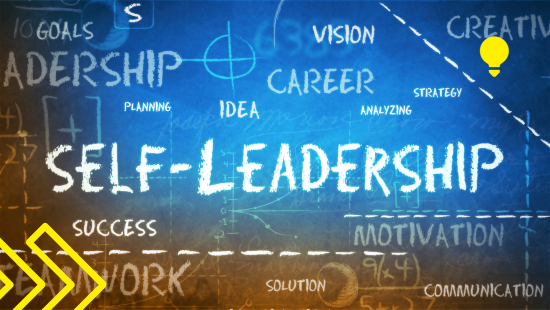18 March 2024

Introduction: Why Self-Leadership is Essential
Self-leadership is the ability to influence, motivate, and guide oneself toward desired goals and outcomes. It involves being able to take charge of your own life, actions, and development. Self-leadership differs from traditional leadership roles in that the focus is inward, on your ability to lead yourself, rather than outward, on leading others.
In today’s rapidly changing and uncertain world, self-leadership is an essential skill for achieving personal and professional success. The accelerating pace of technological disruption means individuals must be able to adapt quickly and stay resilient in the face of setbacks. Meanwhile, traditional organizational structures are giving way to more fluid arrangements that require greater autonomy and self-direction.
This article will explore why self-leadership matters, provide examples of effective self-leadership practices, and offer tips for cultivating your own self-leadership abilities. Mastering self-leadership empowers you to navigate challenges, seize opportunities, and fulfill your potential. By taking ownership of your personal growth and direction, you can shape your own destiny.
Understanding Self-Leadership
Self-leadership is the ability to influence, motivate, and guide oneself toward desired goals and outcomes. It involves managing oneself through self-awareness, self-regulation, goal setting, and self-motivation.
Self-leadership differs from traditional leadership roles where a person leads a team or organization. With self-leadership, the focus is inward on leading oneself rather than outward on leading others.
The key components of self-leadership include:
- Self-awareness – Knowing one’s strengths, weaknesses, values, emotions, and thought patterns. Self-awareness provides a basis for making choices aligned with who we are.
- Self-regulation – Managing one’s thoughts, emotions, and behaviors to stay focused and disciplined. This involves willpower and impulse control.
- Goal setting – Establishing specific, measurable, achievable, relevant and time-bound (SMART) goals based on one’s values, strengths, and aspirations. Goals motivate direction and focus.
- Self-motivation – Generating and sustaining motivation to pursue goals and desired outcomes, especially through setbacks and challenges. Self-motivation drives perseverance.
Mastering these self-leadership skills creates a strong foundation for personal growth and achievement by exerting influence over the direction of one’s life. While traditional leadership shapes the path for others, self-leadership shapes the path for oneself.
The Importance of Self-Leadership
Mastering self-leadership provides numerous benefits that empower individuals to achieve their full potential. By taking ownership of their personal development, individuals build vital skills like resilience, autonomy, adaptability, and accountability.
Self-leadership increases resilience by strengthening one’s ability to cope with challenges and bounce back from adversity. When individuals can regulate their thoughts, emotions, and behaviors, they are less likely to crumble in the face of obstacles. Self-leadership skills such as goal-setting, strategic planning, and self-care allow people to navigate tough situations with poise and purpose.
Practicing self-leadership also promotes autonomy and self-direction. Rather than relying on others for guidance, self-leaders make intentional choices aligned with their values and goals. They take responsibility for their decisions and follow their own compass, rather than blindly conforming to external pressures. This independence and self-determination is invaluable for personal fulfillment.
Additionally, self-leadership boosts adaptability in the face of change. By constantly learning and evolving, self-leaders can pivot seamlessly when circumstances shift. Their growth mindset allows them to perceive change as an opportunity for advancement rather than a threat. This nimbleness is critical to thriving in today’s volatile, uncertain world.
Finally, self-leaders hold themselves accountable rather than playing the blame game. They own their actions, monitor their progress, and make necessary adjustments to stay on track. Their self-discipline drives them to work diligently toward their goals and fulfill their commitments. This personal accountability promotes success while also earning the trust of colleagues.
In summary, developing self-leadership empowers individuals to shape their destiny and unleash their potential. Skills like resilience, autonomy, adaptability, and accountability are indispensable for navigating life’s challenges and seizing new opportunities. By taking the reins of their personal growth, self-leaders are equipped to thrive in any environment and achieve extraordinary success in life and work.
Self-Leadership Best Practices
To master self-leadership, it is essential to consistently practice behaviors and habits that strengthen your ability to guide your thoughts, emotions, and actions. Here are some best practices exhibited by effective self-leaders:
Setting S.M.A.R.T. goals – Self-leaders set specific, measurable, achievable, relevant and time-bound goals that provide clarity and direction. They break down big goals into manageable action steps. For example, if the goal is to run a marathon, specific action steps would be training 3 days a week and setting incremental distance targets.
Practicing self-discipline – Self-discipline is key to remaining focused and overcoming distractions that can impede progress. Self-leaders use techniques like mindfulness, scheduling fixed work blocks, and eliminating unnecessary notifications to minimize distractions.
Continuous learning – Adopting a growth mindset and seeking continuous learning is essential for self-improvement. Self-leaders make time for reading, courses, seminars, and mentoring to keep expanding their skills and knowledge.
Self-care – Effective self-leaders do not neglect their physical, mental and emotional health. They prioritize proper rest, healthy eating, and activities like meditation that provide renewal and resilience.
Visualization – Visualizing the process of achieving goals and desired outcomes can aid motivation and provide direction. Elite athletes and leaders use visualization to reinforce the behaviors and attitudes required for success.
By modeling themselves after other successful self-leaders and committing to daily practices like goal-setting, visualization and learning, individuals can take control of their development and maximize their potential.
Cultivating Self-Leadership Skills
Developing strong self-leadership requires intention and consistent effort. Here are some practical tips for cultivating your self-leadership abilities:
- Invest in personal development activities – Reading inspirational books, listening to motivational podcasts, attending seminars, and seeking out mentors can provide new perspectives and skills for self-leadership. Look for resources that challenge you to grow.
- Establish helpful daily routines – Starting each day with meditation, journaling, exercise, or other uplifting rituals can set you up for self-leadership success. Having structure and self-care practices keeps you grounded.
- Build a support network – Surround yourself with peers, mentors, coaches, or groups who can provide guidance, encouragement, and accountability on your self-leadership journey. Their insights can be invaluable.
- Embrace failure as a teacher – When you encounter setbacks, view them as opportunities for growth rather than reasons to quit. Reflect on what went wrong and what you can change. Each failure makes you wiser.
- Maintain a growth mindset – Believe you can always expand your abilities through effort and experience. Seek regular feedback and focus on progress, not perfection. Keep stretching yourself.
The path of self-leadership requires persistence, flexibility, and a willingness to learn. With the right strategies and support, you can empower yourself to achieve your highest potential.
Developing Self-Awareness
Self-awareness is essential for effective self-leadership. It involves having an accurate understanding of your strengths, weaknesses, values, emotions, and motivations. Developing greater self-awareness empowers you to make decisions aligned with your true self and priorities.
There are several practices that can enhance self-awareness:
- Reflection – Taking time for regular self-reflection helps you gain deeper insight into your thoughts, feelings, and experiences. Maintain a journal to write down your reflections. Review it periodically to check for patterns and progress.
- Mindfulness – Mindfulness meditation helps calm the mind so you can focus inward. Set aside time each day to sit quietly, bring awareness to your breathing, and observe your thoughts and emotions without judgement. Apps like Calm or Headspace can guide your mindfulness practice.
- Feedback – Getting candid feedback from people you trust helps reveal your blindspots. Seek feedback from mentors, coaches, peers or loved ones on your behaviors and impact on others. Receive their input with openness and humility.
Making these practices part of your routine develops your capacity for self-examination, emotional intelligence and understanding of your inner self. With greater self-awareness, you can make choices that align with your values and take steps to reach your full potential.
Setting Effective SMART Goals
Goal setting is a critical component of self-leadership. When setting goals, it is important to follow the SMART framework:
S – Specific: The goal should be well-defined and clear. Vague goals like “get healthier” are hard to measure and achieve. A specific goal would be “lose 10 pounds in 3 months”.
M – Measurable: Include concrete criteria to track progress. “Lose 10 pounds” is measurable compared to “get healthier”.
A – Achievable: Goals should be challenging but within reach. Setting unrealistic goals leads to frustration. Consider your abilities and circumstances to set a goal you can reasonably accomplish.
R – Relevant: Choose goals that align with your values, priorities, and overall objectives. This enhances motivation and gives a sense of purpose. Ask yourself – why is this goal meaningful?
T – Time-bound: Set a timeframe for achieving the goal, such as 3 months. This creates a sense of urgency and keeps you on track.
Setting SMART goals gives clarity and direction. But goals alone are insufficient. Create an action plan detailing the necessary steps to accomplish the goal – the activities, milestones, resources required. An action plan translates goals from intention into implementation. Monitor progress regularly and modify the plan as needed. Enlist support from others to increase accountability.
Practicing Self-Discipline
Self-discipline is essential for executing on goals and overcoming obstacles. By cultivating your self-discipline, you can enhance your ability to manage your time effectively, prioritize important tasks, and stay focused on your objectives. Here are some tips for practicing self-discipline:
Manage Your Time Wisely
- Use a calendar or planner to map out how you spend your time each day or week. Identify any wasted time that could be reinvested into meaningful activities.
- Block out specific periods for focused work on your top priorities. Protect that time by minimizing interruptions.
- Set alarms or reminders for yourself to stay on track with tasks and appointments.
- Eliminate clutter and distractions in your work area to maximize your attention span.
Prioritize Effectively
- Each morning, define your top three priorities for the day. Tackle those first before moving onto other tasks.
- Use the 80/20 rule – identify and focus on the 20% of tasks that generate 80% of your desired results.
- Delegate or outsource tasks that are not an efficient use of your time. Set clear expectations for completion.
- Batch similar tasks together to maximize your productivity flow.
Stay Focused
- Minimize multitasking. Give your full attention to one task at a time.
- Take short breaks when you notice your concentration wavering. A brief walk or snack can refresh your mental focus.
- Remove notifications and apps that can disrupt your work. Mute non-urgent communications.
- Visualize successfully completing tasks before starting to get into a focused, productive mindset.
Applying discipline to how you manage your time, priorities, and focus will empower you to consistently make progress on your most important goals and projects.
Continuous Learning
Self-leadership requires a commitment to continuous learning and growth. Seeking out development opportunities allows individuals to expand their skills, knowledge, and capabilities over time. This enables them to take on new challenges, adapt to changing circumstances, and unlock their full potential.
Some effective ways to pursue continuous learning include:
- Taking courses and workshops to gain new skills. Attend in-person or virtual classes on topics related to your goals.
- Reading books, articles, and blogs to stay updated on industry trends, best practices, and emerging ideas. Make reading a consistent daily habit.
- Listening to educational podcasts during your commute or downtime. Podcasts are a convenient way to learn on the go.
- Watching instructional videos to supplement your skills. Video learning platforms offer tutorials and lectures by experts.
- Joining mastermind groups or networking with peers to exchange knowledge. Surrounding yourself with others who inspire growth.
- Seeking out mentors who can share valuable insights and advice. Learn from someone further ahead on the path.
- Rotating through job positions and responsibilities. On-the-job training keeps skills current.
- Attending conferences and seminars to connect with thought leaders. Take advantage of learning events.
- Practicing and experimenting with new skills through side projects. Hands-on application accelerates learning.
Making learning a lifelong pursuit, rather than a temporary endeavor, allows individuals to maximize their talent over the course of their career. Approach each day with a growth mindset, eager to enhance your abilities through continuous education and development. The self-led learner is empowered to reach new heights of personal and professional success.
Conclusion: Your Self-Leadership Journey Starts Now!
Mastering self-leadership is a journey that requires commitment, perseverance, and a growth mindset. Throughout this article, we explored the significance of self-leadership and the steps required to cultivate it. By taking ownership of your personal growth and intentionally guiding your thoughts, emotions, and behaviors, you have immense power to shape your destiny.
The path of self-leadership enables you to tap into your highest potential. With greater self-awareness, discipline, and purposeful action, you can overcome obstacles, pursue new directions, and unlock fulfillment. Know that you have what it takes to be the leader of your life. Embrace both your strengths and your growing edges. Invest in your own development every day. Celebrate small wins while maintaining sight of your bigger vision.
You are the author of your story. With self-leadership, you hold the pen. Write it consciously, courageously, and boldly from this day forward. Keep growing, keep dreaming, keep leading yourself to the life you envision. You have everything you need within you.
Cheers.
Related Articles
Curiosity: The Superpower for Career Success and Purpose
Unleash the superpower of curiosity to propel your career and discover your purpose. Dive into the transformative journey of exploration, learning, and growth. Embrace curiosity as your compass, guiding you towards fulfillment and success in a rapidly evolving world.
Sympathy vs. Empathy vs. Compassion: What is the Difference?
Delve into the nuances of sympathy, empathy, and compassion—the cornerstones of human connection. Learn to understand, relate, and act with kindness towards others’ experiences. Explore practical ways to cultivate these qualities in your interactions, fostering deeper connections.
Unlocking Creativity: Exploring the Power of Divergent Thinking
Dive into the world of divergent thinking and unlock the boundless potential of creativity! Embrace unconventional ideas, explore possibilities, break free from norms. Discover how fostering divergent thinking can fuel innovation and open new horizons.





https://shorturl.fm/a0B2m
https://shorturl.fm/N6nl1
https://shorturl.fm/N6nl1
https://shorturl.fm/bODKa
https://shorturl.fm/6539m
https://shorturl.fm/68Y8V
https://shorturl.fm/N6nl1
https://shorturl.fm/oYjg5
https://shorturl.fm/68Y8V
https://shorturl.fm/68Y8V
https://shorturl.fm/5JO3e
https://shorturl.fm/Kp34g
https://shorturl.fm/47rLb
https://shorturl.fm/xlGWd
https://shorturl.fm/xlGWd
https://shorturl.fm/IPXDm
https://shorturl.fm/Kp34g
https://shorturl.fm/xlGWd
https://shorturl.fm/47rLb
https://shorturl.fm/Xect5
https://shorturl.fm/PFOiP
Earn up to 40% commission per sale—join our affiliate program now! https://shorturl.fm/7QC4Z
Monetize your audience—become an affiliate partner now! https://shorturl.fm/DbUZq
Boost your income effortlessly—join our affiliate network now! https://shorturl.fm/iD4vS
Unlock exclusive rewards with every referral—apply to our affiliate program now! https://shorturl.fm/Fxh7V
Share our products and watch your earnings grow—join our affiliate program! https://shorturl.fm/NkZEy
Partner with us and earn recurring commissions—join the affiliate program! https://shorturl.fm/01xff
Tap into a new revenue stream—become an affiliate partner! https://shorturl.fm/6MQUL
Boost your income—enroll in our affiliate program today! https://shorturl.fm/tmOlj
Drive sales, earn commissions—apply now! https://shorturl.fm/SZfXa
Boost your profits with our affiliate program—apply today! https://shorturl.fm/OFPVn
Share our products, reap the rewards—apply to our affiliate program! https://shorturl.fm/PtjAV
Join forces with us and profit from every click! https://shorturl.fm/tvLMj
Tap into unlimited earnings—sign up for our affiliate program! https://shorturl.fm/0nrVX
Share your link, earn rewards—sign up for our affiliate program! https://shorturl.fm/ofBa9
Unlock top-tier commissions—become our affiliate partner now! https://shorturl.fm/AiKhk
Sign up for our affiliate program and watch your earnings grow! https://shorturl.fm/1OAgE
Start earning on autopilot—become our affiliate partner! https://shorturl.fm/2BSeQ
Boost your earnings effortlessly—become our affiliate! https://shorturl.fm/0h01e
Share your link and rake in rewards—join our affiliate team! https://shorturl.fm/QUG3W
Apply now and receive dedicated support for affiliates! https://shorturl.fm/XmV5u
Monetize your traffic with our affiliate program—sign up now! https://shorturl.fm/XtDbR
https://shorturl.fm/l1goD
https://shorturl.fm/a4gIw
https://shorturl.fm/Jsbj1
https://shorturl.fm/P5ldf
https://shorturl.fm/SyrwM
https://shorturl.fm/3Rnur
https://shorturl.fm/Yxdv7
https://shorturl.fm/vHDsd
https://shorturl.fm/hMROD
https://shorturl.fm/oEnWB
https://shorturl.fm/uU3gx
https://shorturl.fm/uj5DB
https://shorturl.fm/l7wfH
https://shorturl.fm/RH0d3
https://shorturl.fm/qvIhg
https://shorturl.fm/eL1B4
https://shorturl.fm/aSuaU
https://shorturl.fm/65W8u
https://shorturl.fm/a6Isb
https://shorturl.fm/MUSP9
https://shorturl.fm/6Jx0S
https://shorturl.fm/eqcQL
https://shorturl.fm/jUuip
https://shorturl.fm/loVEH
https://shorturl.fm/bH2gT
https://shorturl.fm/uEvQj
https://shorturl.fm/iNm4U
https://shorturl.fm/IuExB
https://shorturl.fm/6LoCt
https://shorturl.fm/lghvP
https://shorturl.fm/SiJeY
https://shorturl.fm/jlbe1
https://shorturl.fm/JGiSC
https://shorturl.fm/OWgNA
https://shorturl.fm/27ZWJ
https://shorturl.fm/gsQDj
https://shorturl.fm/KnCcY
https://shorturl.fm/uBXk9
https://shorturl.fm/uvoWr
https://shorturl.fm/Bmqkd
https://shorturl.fm/32aQi
https://shorturl.fm/9yqwo
https://shorturl.fm/9iMRP
https://shorturl.fm/jKd0W
https://shorturl.fm/tlKIH
**neuro sharp**
neurosharp is a high-quality cognitive support formula made to elevate memory, attention, and overall mental performance.
https://shorturl.fm/A8ono
https://shorturl.fm/xpi48
**prostadine**
prostadine is a next-generation prostate support formula designed to help maintain, restore, and enhance optimal male prostate performance.
**sugarmute**
sugarmute is a science-guided nutritional supplement created to help maintain balanced blood sugar while supporting steady energy and mental clarity.
**gl pro**
gl pro is a natural dietary supplement designed to promote balanced blood sugar levels and curb sugar cravings.
**prodentim**
prodentim an advanced probiotic formulation designed to support exceptional oral hygiene while fortifying teeth and gums.
**mitolyn**
mitolyn a nature-inspired supplement crafted to elevate metabolic activity and support sustainable weight management.
**vitta burn**
vitta burn is a liquid dietary supplement formulated to support healthy weight reduction by increasing metabolic rate, reducing hunger, and promoting fat loss.
**synaptigen**
synaptigen is a next-generation brain support supplement that blends natural nootropics, adaptogens
**zencortex**
zencortex contains only the natural ingredients that are effective in supporting incredible hearing naturally.
**yu sleep**
yusleep is a gentle, nano-enhanced nightly blend designed to help you drift off quickly, stay asleep longer, and wake feeling clear.
**nitric boost**
nitric boost is a dietary formula crafted to enhance vitality and promote overall well-being.
**glucore**
glucore is a nutritional supplement that is given to patients daily to assist in maintaining healthy blood sugar and metabolic rates.
**wildgut**
wildgutis a precision-crafted nutritional blend designed to nurture your dog’s digestive tract.
**breathe**
breathe is a plant-powered tincture crafted to promote lung performance and enhance your breathing quality.
**energeia**
energeia is the first and only recipe that targets the root cause of stubborn belly fat and Deadly visceral fat.
**boostaro**
boostaro is a specially crafted dietary supplement for men who want to elevate their overall health and vitality.
**pinealxt**
pinealxt is a revolutionary supplement that promotes proper pineal gland function and energy levels to support healthy body function.
**prostabliss**
prostabliss is a carefully developed dietary formula aimed at nurturing prostate vitality and improving urinary comfort.
**potent stream**
potent stream is engineered to promote prostate well-being by counteracting the residue that can build up from hard-water minerals within the urinary tract.
**hepatoburn**
hepatoburn is a premium nutritional formula designed to enhance liver function, boost metabolism, and support natural fat breakdown.
**hepato burn**
hepato burn is a potent, plant-based formula created to promote optimal liver performance and naturally stimulate fat-burning mechanisms.
**cellufend**
cellufend is a natural supplement developed to support balanced blood sugar levels through a blend of botanical extracts and essential nutrients.
**prodentim**
prodentim is a forward-thinking oral wellness blend crafted to nurture and maintain a balanced mouth microbiome.
**flow force max**
flow force max delivers a forward-thinking, plant-focused way to support prostate health—while also helping maintain everyday energy, libido, and overall vitality.
**revitag**
revitag is a daily skin-support formula created to promote a healthy complexion and visibly diminish the appearance of skin tags.
**neuro genica**
neuro genica is a dietary supplement formulated to support nerve health and ease discomfort associated with neuropathy.
**sleeplean**
sleeplean is a US-trusted, naturally focused nighttime support formula that helps your body burn fat while you rest.
**memorylift**
memorylift is an innovative dietary formula designed to naturally nurture brain wellness and sharpen cognitive performance.
https://shorturl.fm/O8dfJ
https://shorturl.fm/K9Xt9
https://shorturl.fm/tAtlK
https://shorturl.fm/ZaKfB
https://shorturl.fm/7fZiY
1 win mirror — вход в мир больших выигрышей и быстрых выплат! Регистрация за пару минут, бонусы до 100% на первый депозит, фриспины и кэшбэк до 15%, ставки на спорт с высокими коэффициентами и лайв-ставки, быстрый вывод средств в личном кабинете. Играйте в онлайн-казино и делайте ставки на спорт — всё для вашего реального выигрыша и максимальной выгоды!
Aviator crash 1win — начни играть прямо сейчас и умножай свой шанс на реальный выигрыш! Здесь тебя ждут высокие коэффициенты, быстрый вывод средств, бонусы за депозит до 150%, фриспины и кэшбэк до 10%, а минимальный депозит — всего 100 рублей. Погрузись в увлекательный мир онлайн казино и ставок на спорт, используй промокод для бонусов и получи доступ к личному кабинету 24/7!
Вин номер логан 1 где — сделайте ставку в 1win и получите до 100% бонуса за депозит! Онлайн-казино и ставки на спорт с быстрым выводом, фриспинами и лайв-ставками, высокие коэффициенты и кэшбэк до 15%, а также максимально простая регистрация с минимальным депозитом — играйте круглосуточно и получайте реальный выигрыш прямо в личный кабинет!
https://t.me/s/Beefcasino_officials
Bạn có thể đánh bài theo level và điều chỉnh mức cược phù hợp như: 1K, 2K, 5K, 10K, 100K, 200K,… Chúng tôi cung cấp thêm chế độ trải nghiệm miễn phí cho bạn thoải mái làm quen. 188v com Hơn 150+ trò chơi cá cược đổi thưởng 3D đang được cập nhật liên tục mỗi ngày. TONY12-11A
This post came at just the right time for me Your words have provided me with much-needed motivation and inspiration Thank you
Sau gần 5 năm hoạt động, thương hiệu không chỉ có được vị thế vững chắc trên thị trường mà còn khẳng định đẳng cấp của mình khi sở hữu đầy đủ giấy chứng nhận hợp pháp từ PAGCOR và CEZA. 66b chính thức Do vậy, bạn hoàn toàn có thể yên tâm tham gia cá cược thỏa mãn đam mê của mình mà không cần lo ngại về những vấn đề pháp lý khác. TONY12-16